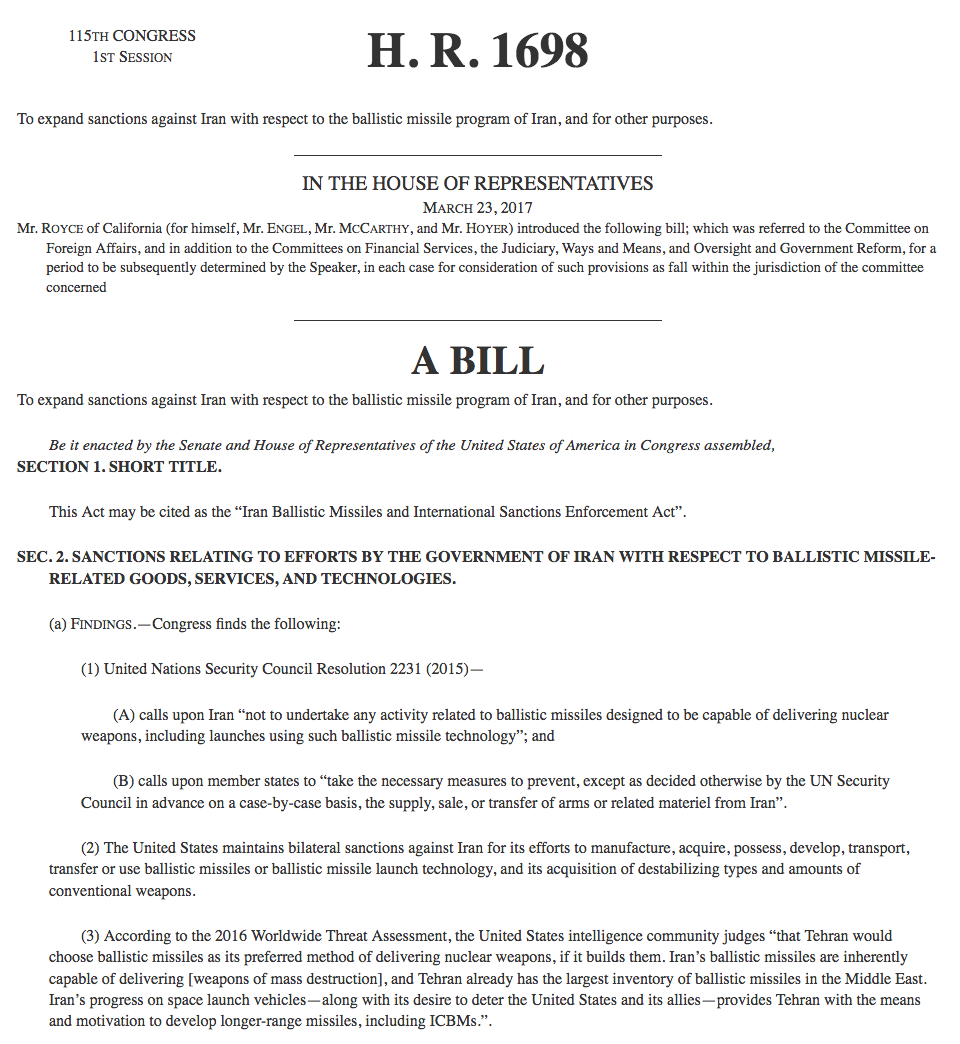On March 23, 2017, the Iran Ballistic Missiles and International Sanctions Enforcement Act (H.R. 1698) was introduced by Reps. Ed Royce (R-CA-39), Eliot Engel (D-NY-16), Kevin McCarthy (R-CA-23), and Steny Hoyer (D-MD-5). The bill amends the Iran Sanctions Act to mandate the President to impose sanctions on parties providing support to Iran’s ballistic missile and conventional weapons programs.
In mandating President Trump utilize new sanctions authorities, the legislation risks incentivizing the Trump administration to engage in aggressive actions towards Iran that could undermine the Joint Comprehensive Plan of Action (JCPOA) – the nuclear accord between the United States, other major world powers, and Iran – all the while setting the stage for conflict between the two countries. Undoing the long-term restrictions on Iran’s nuclear program in service of an aggressive focus on Iran’s ballistic missile program would be in clear contradiction of U.S. interests.
Moreover, the timing of the legislation is inopportune. In less than two months, Iran will hold its presidential election. The imposition of new sanctions on Iran – even for activities not related to Iran’s nuclear program – risks distorting Iran’s domestic politics in favor of hardline candidates. This would broadly undermine U.S. interests by undermining moderate candidates open to engagement with the United States (as evidenced by the recent nuclear agreement) in favor of those who evidence implacable hostility towards Washington.
Sanctions and Reporting Requirements
The bill has two main components: (1) reporting requirements that mandate the President to detail Iran’s domestic and foreign supply chain in support of its ballistic missile program, as well as to submit tri-annual reports on Iran’s involvement in sanctionable activities related to its ballistic missile and conventional weapons programs; and (2) amendments to the Iran Sanctions Act that mandate the imposition of sanctions on parties involved in or otherwise supporting Iran’s ballistic missile and conventional weapons programs.
New Sanctions
Specifically, the bill would amend § 5(b) of the Iran Sanctions Act by mandating the President to impose sanctions with respect to: (1) an agency or instrumentality of the Iranian government that seeks to develop, procure, or acquire goods, services, or technology that materially contributes to efforts by the Iranian government with respect to ballistic missile-related goods, services, and technologies in violation of United Nations Security Council Resolution 2231 (UNSCR 2231); (2) a foreign person or State if the foreign person or State knowingly provides material support to the Iranian government that materially contributes to Iranian government efforts with respect to ballistic missile-related goods, services, or technologies in violation of UNSCR 2231; or (3) a foreign person that the President determines knowingly engages in a significant transaction with, or provides significant financial services for, a foreign person or State described above with respect to proscribed ballistic missile-related activities.
The bill would also amend § 5(b) of the Iran Sanctions Act to mandate the imposition of sanctions on foreign persons or States if the President determines that the person or State knowingly imports, exports, or re-exports to, into, or from Iran, directly or indirectly, any significant arms or related materiel prohibited by UNSCR 2231.
Finally, the bill would amend § 5(b) of the Iran Sanctions Act by mandating the President to impose sanctions on persons that knowingly export or transfer, or permit or otherwise facilitate the transshipment or re-export of, goods, services, technology, or other items to Iran that materially contribute to Iran’s ability to (1) acquire or develop ballistic missiles or related launch technologies; or (2) acquire or develop destabilizing numbers and types of advanced conventional weapons.
Reporting Requirements
The bill requires the President to submit a report to Congress detailing the foreign and domestic supply chain in Iran that directly or indirectly significantly facilitates, supports, or otherwise aids Iran’s ballistic missile program, as well as an assessment of the Government of Iran’s ability to indigenously manufacture or otherwise produce the goods, services, or technology meant to support its ballistic missile program. Such report shall also include an identification of foreign persons that have directly or indirectly facilitated or supported the development of Iran’s ballistic missile program. The report shall be submitted to Congress in unclassified form.
The bill also mandates the President to submit a tri-annual report to Congress that details (1) Iran’s efforts to develop, procure, or acquire goods, services, or technology for which sanctions may be imposed under the Iran Sanctions Act; (2) Iran’s acquisition or attempted acquisition of significant arms and related materiel in violation of UNSCR 2231; (3) Iran’s export or attempted export of significant arms or related materiel in violation of UNSCR 2231; and (4) any Security Council approval for the export to Iran of significant arms or related material pursuant to UNSCR 2231.
Finally, the bill requires the President to submit a report to Congress upon receipt of credible information that Iran has conducted a test of a ballistic missile, detailing whether such test fails to comply with, violates, or is in defiance of UNSCR 2231. Such report shall also identify Iranian persons responsible for ordering, controlling, or otherwise directing the missile test and determining whether such persons are subject to U.S. sanctions as of the date of the report. The report shall also contain notice as to the steps that the President is taking to respond to the ballistic missile test. This report shall also be submitted in unclassified form.
Back to top